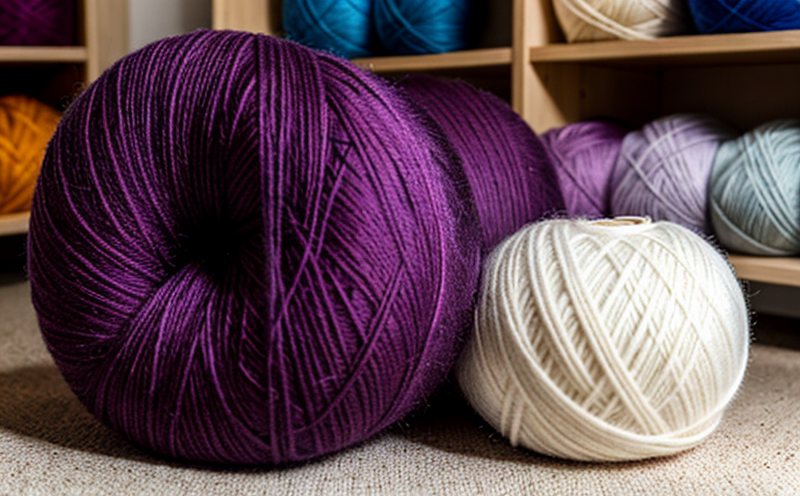ASTM D2256 Tensile Properties of Yarns by CRE Machine
The ASTM D2256 standard specifies the procedure for determining the tensile properties of yarns using a Constant Rate of Extension (CRE) machine. This method is particularly valuable in the textile industry, ensuring that yarns meet stringent quality requirements and are fit for their intended applications.
Understanding the tensile behavior of yarns is crucial for optimizing manufacturing processes and ensuring product performance. The CRE machine measures how much force a sample can withstand before breaking under constant extension rate conditions. This test provides critical insights into the strength, elongation, and modulus of elasticity, which are essential parameters in textile quality assessment.
The CRE machine operates by applying a controlled rate of extension to a yarn specimen while measuring the corresponding stress-strain curve. Specimens are typically cut from fabric or yarn rolls and prepared according to ASTM D2256 specifications. The specimens should be straight, free from defects, and representative of the material's properties.
The test setup involves mounting the yarn sample on the machine’s grips, ensuring proper alignment with the extension direction. The machine then applies a controlled extension rate until failure occurs. Data points are collected throughout this process, including peak force, fracture strength (tensile strength), elongation at break, and modulus of elasticity.
The results obtained from ASTM D2256 testing are used to assess the mechanical integrity of yarns. These findings help in selecting appropriate materials for specific applications such as weaving, knitting, or manufacturing durable products like ropes, belts, and industrial fabrics.
Compliance with industry standards is essential, especially when dealing with regulated markets. ASTM D2256 ensures that the testing process adheres to international best practices, enhancing confidence in product quality and facilitating smoother supply chain operations.
Benefits
- Enhanced Quality Control: ASTM D2256 ensures consistent yarn performance by providing precise measurements of tensile properties. This helps textile manufacturers maintain high-quality standards across production batches.
- Improved Product Design: Understanding the tensile behavior of yarns allows for better design choices, leading to more robust and reliable products. Engineers can make informed decisions about material selection based on test results.
- Informed Procurement Decisions: Suppliers can use ASTM D2256 data to evaluate yarn quality before purchase, ensuring they receive high-quality raw materials that meet their specifications.
By leveraging the insights gained from this testing method, companies can enhance product durability, reduce waste, and improve overall efficiency in production processes. This translates into higher customer satisfaction and a competitive edge in the market.
Quality and Reliability Assurance
The ASTM D2256 standard is widely recognized for its accuracy and repeatability, making it an essential tool for quality assurance in textile manufacturing. Compliance with this standard ensures that the testing process is consistent across different laboratories, thereby enhancing reliability.
Our facility adheres strictly to ISO 17025 standards, which require us to maintain a high level of competence and impartiality in our testing services. This commitment guarantees that every ASTM D2256 test conducted here meets the highest quality and reliability benchmarks.
We utilize state-of-the-art CRE machines that are regularly calibrated and maintained to ensure precise measurements. Our team of experienced technicians ensures that each specimen is prepared and tested according to ASTM D2256 specifications, minimizing human error. The comprehensive reporting provided after each test includes all relevant data points, allowing for thorough analysis.
By integrating ASTM D2256 into our testing protocols, we help ensure that every batch of yarn meets the required quality standards. This not only protects the reputation of our clients but also contributes to a safer and more sustainable textile industry.
Customer Impact and Satisfaction
- Increased Customer Trust: By adhering strictly to ASTM D2256, we provide consistent and reliable test results that instill confidence in our clients.
- Enhanced Product Reputation: Positive outcomes from these tests can lead to higher customer satisfaction and a better reputation for your brand.
- Competitive Advantage: Superior product quality derived from ASTM D2256 testing can give you the edge in competitive markets.
- Sustained Compliance: Ensuring compliance with industry standards helps maintain regulatory approval and market access for your products.
We aim to exceed customer expectations by offering prompt, accurate, and thorough service. Our commitment to excellence ensures that you receive reliable data that can be trusted in critical decision-making processes.





